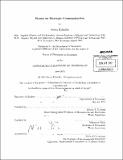| dc.contributor.advisor | Robert S. Gibbons and Muhamet Yildiz. | en_US |
| dc.contributor.author | Kolotilin, Anton | en_US |
| dc.contributor.other | Massachusetts Institute of Technology. Dept. of Economics. | en_US |
| dc.date.accessioned | 2012-09-13T18:55:22Z | |
| dc.date.available | 2012-09-13T18:55:22Z | |
| dc.date.copyright | 2012 | en_US |
| dc.date.issued | 2012 | en_US |
| dc.identifier.uri | http://hdl.handle.net/1721.1/72838 | |
| dc.description | Thesis (Ph. D.)--Massachusetts Institute of Technology, Dept. of Economics, 2012. | en_US |
| dc.description | Cataloged from PDF version of thesis. | en_US |
| dc.description | Includes bibliographical references (p. 105-108). | en_US |
| dc.description.abstract | The first chapter studies optimal information revelation with one-sided asymmetric information. A sender chooses ex ante how her information will be revealed ex post. A receiver obtains both public information and information revealed by the sender, and then takes one of two actions. The sender wishes to maximize the probability that the receiver takes the desired action. The sender optimally reveals only whether the receiver's utility is above a cutoff. The cutoff is such that the receiver is indifferent between the two actions when he learns that his utility is above the cutoff. The sender's welfare increases and the receiver's welfare does not change with the precision of the sender's information. The sender's welfare decreases and the receiver's welfare increases with the precision of public information. The second chapter studies optimal information revelation with two-sided asymmetric information. A sender chooses ex ante how her information will be revealed ex post with the goal of persuading an informed receiver to take one of two actions. The sender faces a tradeoff between the frequency and the persuasiveness of messages: sending positive messages more often (in terms of the sender's private information) makes it less likely that the receiver will take the desired action (in terms of the receiver's private information). Under the optimal mechanism, the sender's and receiver's welfare is not monotone in the precision of the receiver's private information. I provide necessary and sufficient conditions when the full information revelation is optimal and when the no information revelation is optimal. The third chapter (co-authored with Li Hao and Wei Li) studies a principal-agent problem where the only commitment for the uninformed principal is to restrict the set of decisions she makes following a report by the informed agent. Compared to no commitment, the principal improves the quality of communication from the agent. An ex ante optimal equilibrium for the principal corresponds to a finite partition of the state space, and each retained decision is suboptimal for the principal, biased toward the agent's preference. Generally an optimal equilibrium does not maximize the number of decisions the principal can credibly retain. | en_US |
| dc.description.statementofresponsibility | by Anton Kolotilin. | en_US |
| dc.format.extent | 108 p. | en_US |
| dc.language.iso | eng | en_US |
| dc.publisher | Massachusetts Institute of Technology | en_US |
| dc.rights | M.I.T. theses are protected by
copyright. They may be viewed from this source for any purpose, but
reproduction or distribution in any format is prohibited without written
permission. See provided URL for inquiries about permission. | en_US |
| dc.rights.uri | http://dspace.mit.edu/handle/1721.1/7582 | en_US |
| dc.subject | Economics. | en_US |
| dc.title | Essays on strategic communication | en_US |
| dc.type | Thesis | en_US |
| dc.description.degree | Ph.D. | en_US |
| dc.contributor.department | Massachusetts Institute of Technology. Department of Economics | |
| dc.identifier.oclc | 807061506 | en_US |
